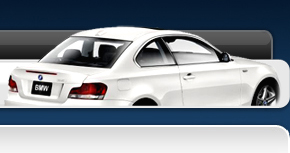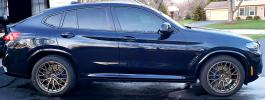


|
|
|
 |
| 12-21-2012, 12:14 PM | #1 |
|
Lieutenant
   137
Rep 571
Posts |
We all know the 6AT problem with the n54 engine, it can't handle the massive torque after installing any upgraded turbos at high boost.
Is it possible to limit the torque to protect the gearbox, if the car generates 500 rw torque can the tuner reduce it to 420 and keep the rwhp the same  where i can find after market transmission can handle more torque up to 700  |
| 12-21-2012, 12:41 PM | #2 |
|
Just one more taste...

566
Rep 2,011
Posts |
Or do a MT swap??
__________________
My Build Thread: Jet Black 6MT 128i with MSport
|
|
Appreciate
0
|
| 12-21-2012, 01:03 PM | #3 |
|
European Editor

10528
Rep 22,992
Posts |
Maybe you should talk to Mannhart Racing GmbH. They do a V8 twin turbo swap for the M3's... when they install a 550i/650i/X5/X6 engine into an M3. The engine puts out around ~743 Hp and ~1,000 Nm of Tq. Funny thing is they ditch the DCT and install a Steptronic bc it is STRONGER trans!
__________________
|
|
Appreciate
0
|
| 12-21-2012, 01:34 PM | #4 |
|
Private
 6
Rep 51
Posts |
|
|
Appreciate
0
|
| 12-21-2012, 01:44 PM | #5 |
|
Captain
    14
Rep 961
Posts |
Yes, it is very much possible to have the car tuned to go easy on the gear box. Using Cobb and a good pro tuner(I recommend Jake@protuningfreaks) it is possible to dial in any power curve you want.
However, there are a few AT guys running bigger snails making 500+rwtq without severe issues(trans slippage in the 4-5 shift is the biggest problem at the moment.)
__________________
"I'm not surprised you get along well with all the other neighbours. If you put fifty children with Down's syndrome in a room there is going to be a lot of hugging." David Thorne
|
|
Appreciate
0
|
| 12-21-2012, 02:49 PM | #6 | |
|
Major
 
195
Rep 1,317
Posts |
Quote:
As far as the actual gearbox is concerned the 6MT is actually weaker than the Steptronic auto that the N54 cars had (and also the DCT in the N55 cars) (however the clutches in the DCT cars do start slipping at above 600Nm+ torque though by all accounts but given the tranny is rated at 600Nm that's to be expected) You might be able to get some aftermarket stronger bits for the torque-converter and maybe some internal parts for the ZF Steptonic from a N54 car? Must be some competition auto tranny shops in the USA that will be able to say for definate.
__________________
2017 X5 4.0dSE ~ Atlas Cedar:Ind.Amaro Brown Merino&Piano Blk, Sport Auto, DHP, Comfort seats, Cold weather pack, HK audio, Electric towbar, Sun protection glass.
|
|
|
Appreciate
0
|
| 12-21-2012, 04:03 PM | #7 |
|
Captain
    
37
Rep 747
Posts |
^^^ this. I've only heard trans issues from DCT and to a lesser extent, some clutch issues with the 6MT when 500 or higher RWTQ. I was under the impression that the 6AT in the 08-10 was pretty good at handling the crazy power from upgraded turbos.
|
|
Appreciate
0
|
| 12-21-2012, 04:23 PM | #8 |
|
Brigadier General
 732
Rep 3,274
Posts |
I don't know where to help you find another transmission, but it should be explained that you cannot just ask for horsepower and "hold the torque" like you're asking. Horsepower and torque are intrinsically related. Torque is a measure of the force going to the wheels. Horsepower is a measure of how many times that force is transferred to the wheels per unit of time (power). I guess a way of explaining it is that your particular engine will make a certain amount of force to get the car moving, and the horsepower is a measure of how effectively and how often that power gets to the wheels. Horsepower will always equal torque at 5252 RPM because at that RPM the mathematical relationship between the two balances out to 1.
Basically, the only solution would be to limit your power/torque overall to protect the gearbox, or to upgrade the gearbox itself. You can't limit the torque but have the same number of horses.
__________________
2022 X4 M40i - 2008 135i - 2015 F700GS On Order - 2024 i4 M50 Scruffy's gonna die the way he lived... Mmhm.  |
|
Appreciate
0
|
| 12-21-2012, 05:21 PM | #9 | |
|
Lieutenant
   137
Rep 571
Posts |
Quote:
and i think they can limit (lower) the torque by the tune, if it's possible then we can see an n54 6AT with +600rwhp  |
|
|
Appreciate
0
|
| 12-21-2012, 06:17 PM | #10 | |
|
Major
 
81
Rep 1,051
Posts |
Quote:
Tuned turbo cars inherently end up with big torque peaks near low or midrange RPM and it tapers at higher RPM. To limit torque and have the same horsepower, lower peak boost, which occurs before peak horsepower. Keep boost the same at horsepower peak so you keep the same power. The factory tune is actually much like this with a long, flat torque curve. Tuned cars take advantage of the factory underutilization of the turbo in low to mid ranges, with huge peak boost numbers, and high torque numbers.
__________________
2009 BMW 135i 6MT Sport, AFE intake, Cobb AP, Apex 18x8.5+9.5, 255/275 PSS
|
|
|
Appreciate
0
|
| 12-21-2012, 07:41 PM | #11 | |
|
Brigadier General
 732
Rep 3,274
Posts |
You can TUNE the engine to have a slightly different torque curve, but no matter what the application, the conversion between horsepower and torque remains the same at any given RPM:
Quote:
So, let's look at three examples... [quote]Example 1: How much TORQUE is required to produce 300 HP at 2700 RPM? Answer: TORQUE = 300 x 5252 ÷ 2700 = 584 lb-ft. Example 2: How much TORQUE is required to produce 300 HP at 4600 RPM? Answer: TORQUE = 300 x 5252 ÷ 4600 = 343 lb-ft. Example 3: How much TORQUE is required to produce 300 HP at 8000 RPM? Answer: TORQUE = 300 x 5252 ÷ 8000 = 197 lb-ft. [/quote] Horsepower is a function of torque over time. So you can see that the amount of torque needed to produce the same amount of horsepower at different rpms decreases as the engine spins faster, because horsepower is basically defined as the amount of torque being produced per second. If the engine spins more times per second, the horsepower increases for the same amount of torque because that force is applied more per second. It doesn't matter how the engine tries to modulate the boost. (At least, I don't think it does. If you think I'm wrong, go ahead and tell me how. I'm not trying to argue, and I will concede if you are truly correct and I am not). The numbers of horsepower and torque are inherently linked at any given RPM. The engine can try to keep the rpms higher, so more horsepower is produced for the same amount of torque, and this is basically what happens during the long flat part of the torque curve. The engine is creating the force, not the power. The engine creates the same amount of force from 2500 all the way to 5500 or so RPMs, but the horses steadily increase because the same force is being applied more often per second as RPMs increase. As you go higher in the RPM range, the engine becomes less efficient and creates less force. However, the RPMs are still increasing, so the HP doesn't necessarily taper off yet until the negative effect of the torque decrease outweighs the positive effect of the engine spinning faster. When you see a dyno sheet, the only thing the engine "creates" on that sheet is the torque curve. The engine can produce different amounts of force at different RPMs, but given a torque curve, the horsepower curve should more or less be the correspond directly to it, because it's a mathematical relationship. The engine isn't producing both power and force, it's producing force, the the power is "makes" is related to the force produced at a given RPM. What you were saying is correct in that you can limit the torque and boost and still achieve the same PEAK horsepower through modulating the engine, and have similar horsepower numbers in the upper RPM ranges where less torque is required to achieve those numbers, but down low you would suffer in terms of horses because to achieve the same horses at a lower RPM you would need that extra, tranny-crushing force. But for trying to save the tranny, I don't think that keeping the same peak horses while limiting torque is what he is trying to achieve. At least that's my take on it. There's no real way around it. Again, I don't appreciate being called "absolutely ridiculous" and I am not trying to have a flame war or an argument here. I'm just explaining what I know. If I'm wrong, I will gladly concede and agree you're right, but in this case I do not believe I am. Also, I figured it's probably helpful for anyone reading (including OP) to know the relationship, so forgive me if I rehashed things you already know since I'm just trying to create a good basic explanation for readers (because honestly, Freon, I consider you one of my most knowledgeable people on this forum.. i just think this time you're wrong  ) )
__________________
2022 X4 M40i - 2008 135i - 2015 F700GS On Order - 2024 i4 M50 Scruffy's gonna die the way he lived... Mmhm.  |
|
|
Appreciate
0
|
| 12-22-2012, 05:34 AM | #12 | |||
|
Lieutenant
   137
Rep 571
Posts |
[QUOTE=1speedbike;13193977]You can TUNE the engine to have a slightly different torque curve, but no matter what the application, the conversion between horsepower and torque remains the same at any given RPM:
So, let's look at three examples... Quote:
Quote:
Quote:
if w apply this rule TORQUE = 500(hp) x 5252 ÷ 5500 = 477 impossible!! |
|||
|
Appreciate
0
|
| 12-22-2012, 08:48 AM | #13 |
|
Major
 340
Rep 1,293
Posts |
^ I think you are looking at this all wrong. You assume the engine is putting out 500 HP at 5500 RMPs. This is cannot be the case. All you can tell from the 550 HP/380 torque numbers that are quoted is where in the RPMs peak horsepower will be reached. In this case 7601 RMPs.
The relationship between torque and horsepower is not debatable. In fact there is no way to measure horsepower on a dyno. The dyno measures torque and RPM. Horsepower (as defined) is calculated using the following formula: HP = (Torque * RPM)/5252 Sorry but these are the facts. |
|
Appreciate
0
|
Post Reply |
| Bookmarks |
|
|